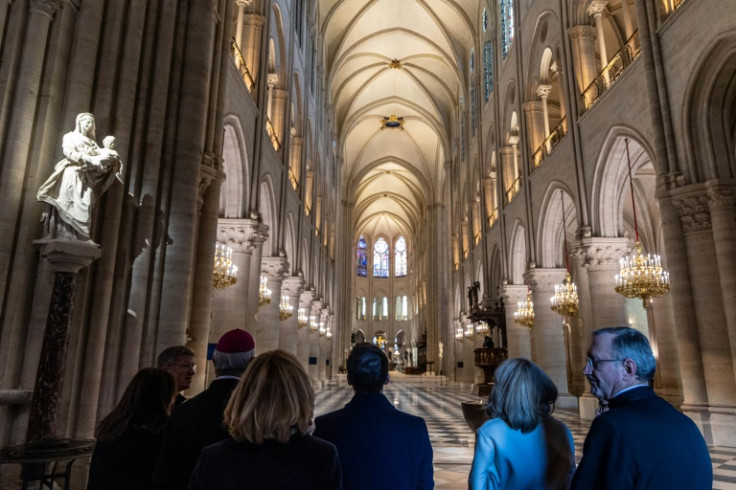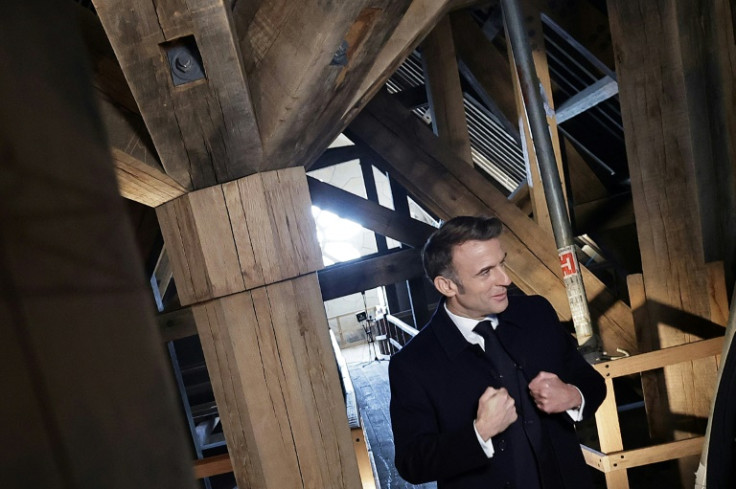
"We can do it!" President Emmanuel Macron told France on the night of April 16, 2019, the day after the fire that ravaged Notre Dame, as he set a target of five years to rebuild the great mediaeval edifice in the heart of Paris to its former glory.
When he attends the re-opening ceremony of Notre Dame on Saturday, Macron can boast that this target has been met, dispelling the doubts of many who argued that the half decade goal was wildly ambitious.
Furthermore, he has scored a major diplomatic coup by attracting US president-elect Donald Trump to the ceremony for his first foreign trip since his election victory, along with scores of other world leaders, turning Paris into the hub of world diplomacy for the day.
The opening will cap a historic year for the French capital which this summer hosted a hugely successful Olympic Games launched by a ground-breaking and river-based opening ceremony that, although controversial, was unforgettable.
But while Macron will seek to bask in the glory of the reopening of Notre Dame, it also comes just three days after parliament voted to oust his Prime Minister Michel Barnier and deepen a months-long political crisis.
With Barnier staying on as a caretaker until Macron finds a successor, the ceremony will take place without a permanent head of government.
The shine of the sun-kissed Olympics and Paralympics, which brought Parisians, the French and foreign visitors together over joyous summer weeks, now appears a parenthesis in a bleak and turbulent year.
But always defiant, Macron in an address to the nation late on Thursday pointed to Notre Dame's reconstruction as a source of motivation to find a way out of the political quagmire.
"It's the proof that we're able to do great things, that we can do the impossible... It's the same thing we need to do for the nation," he said.
Macron is due to launch the reopening by giving an address outside the cathedral before its doors are officially swung open by the clergy. On Sunday, he will attend the first mass open to the public.
The choreography was the subject of intense negotiations with the church: the Elysee wanted a presidential speech inside Notre Dame, but this option raised eyebrows both within the Church and among defenders of France's strictly secular system.
In the end, last week Macron spoke inside Notre Dame during a final inspection that resembled a pre-opening in all but name, allowing the world to discover its restored beauty on television.
It gave him the chance to reaffirm the success of meeting the five year goal despite all those who said "that it would not be possible, that it was crazy, that it was arbitrary, that we were going to do it wrongly".
"He put in place a framework that made it possible. It's not abnormal if he tries to profit from it or rejoices in it," said a government source asking not to be named.
Indeed, Macron has appeared to turn the entire reconstruction into a metaphor of his presidency and even the French nation, presenting it as a battle of boldness and ambition against the naysayers who predict failure.
In a typical Macronian assertion, he last week told the artisans who worked on the reconstruction: "You have shown the world that nothing resists audacity."
But for all the troubles at home, Macron will likely take solace from the presence of Trump as an example of his ability to blaze a trail on the international stage and show fellow EU leaders it is possible to deal with the tycoon-turned-president.
EU chief Ursula von der Leyen will be present and is unlikely to resist the chance of an encounter with Trump. The outgoing administration of Joe Biden will be represented by his wife Jill.
Trump posted on his Truth Social network that Macron had "done a wonderful job ensuring that Notre Dame has been restored to its full level of glory, and even more so. It will be a very special day for all!"










